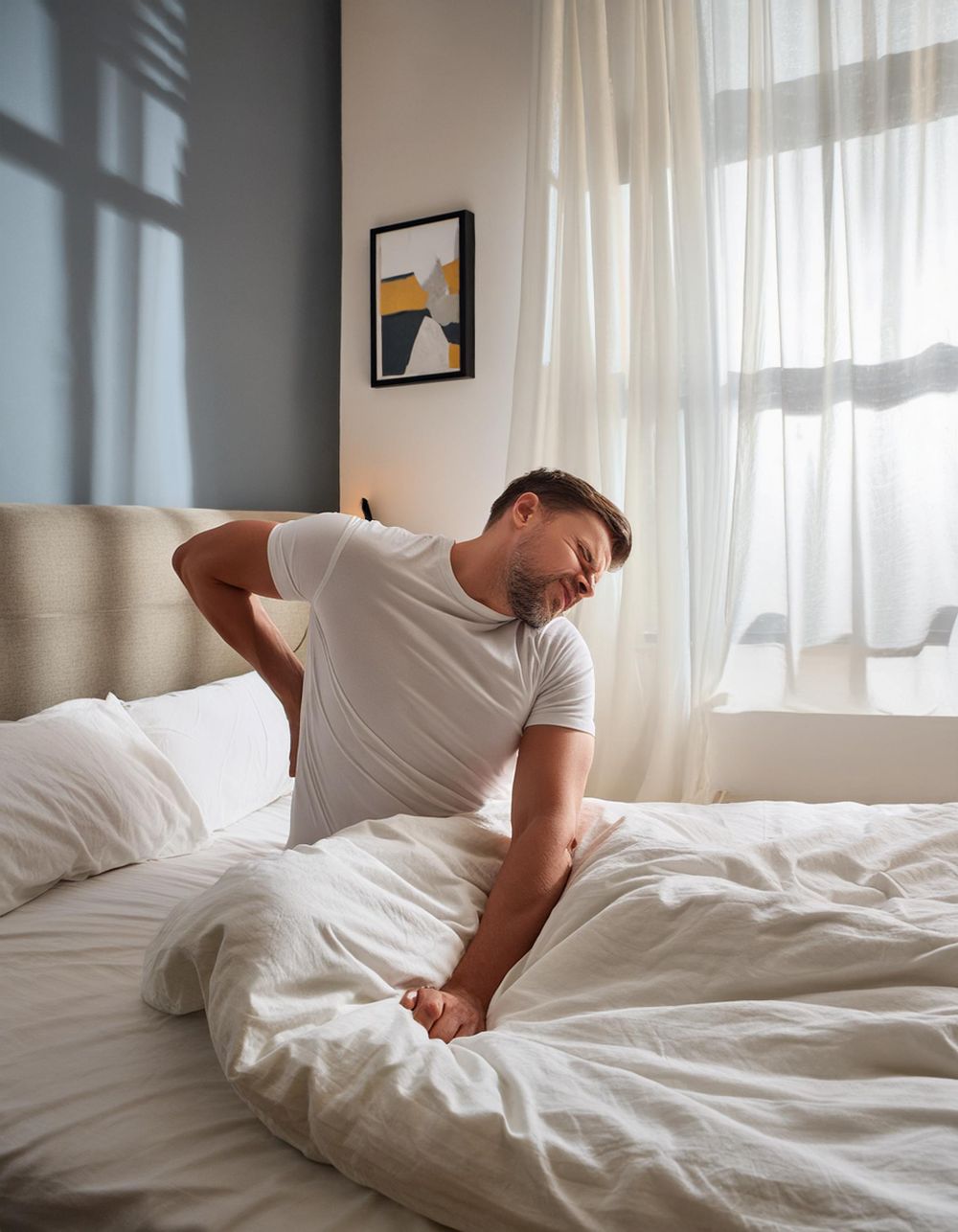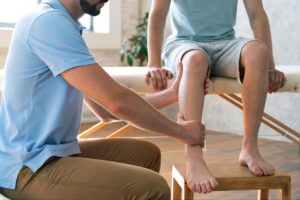“Sleep is not just rest, it’s recovery. And how you sleep determines how you move, heal, and function.”
Ritika’s Story: A Wake-Up Call for Movement Health
Ritika, a 38-year-old finance professional, came to VARDĀN with a puzzling complaint. Despite regular workouts, ergonomic furniture, and no injury history, she experienced persistent morning neck stiffness and lower back pain. Her scans were normal, her posture was conscious and yet, the pain persisted.
After a detailed evaluation, we uncovered the hidden cause: her sleep position.
She’d been sleeping on her stomach for years, with one arm under her pillow and her head turned sharply to the side. This long-standing pattern had overstrained her cervical spine, locked her thoracic fascia, and misaligned her pelvis, resulting in chronic pain her daytime routine couldn’t undo.
Ritika’s case isn’t rare. In fact, it’s one of the most overlooked factors in chronic pain.
Sleep Isn’t Just Rest, It’s Recovery.
We spend nearly one-third of our lives sleeping. But what if your sleep position is silently undoing all your efforts at recovery?
Why it matters: When you stay in one position for hours, your muscles, fascia, and joints adapt. If that posture isn’t neutral or supported, your body pays the price, with stiffness, misalignment, and eventual pain.
At VARDĀN, we often see clients who’ve tried everything from exercise to therapy yet still wake up stiff, sore, or fatigued. One overlooked factor? Poor sleep posture.
The way you sleep affects everything from spinal alignment to fascia health. And over time, poor positioning can lead to chronic pain that doesn’t go away even after a full night’s rest.
The Wrong Sleep Position Can Disrupt Alignment
- Intervertebral discs
- Neck and shoulder muscles
- Hip joints
- Fascia and soft tissue

Fascia: The Missing Link in Sleep-Related Pain
- Neck and shoulder tightness
- Lower back pain
- Hip and pelvic imbalance
- Reduced joint mobility
Why Sleep Positions Matter More Than You Think
-
Prolonged Tissue Compression
Soft tissues like fascia and muscles get compressed when your sleeping posture is suboptimal. Over time, this causes adhesions and tightness—especially in the shoulders, hips, and lower back. -
Spinal Misalignment
Unsupported sleeping positions distort the spine’s natural curves, especially at the neck, thoracic spine, and pelvis. This leads to morning stiffness and long-term postural compensation. -
Neuromuscular Dysfunction
Poor sleep posture can lead to nerve compression—causing tingling, numbness, or lingering muscle tightness that regular workouts can’t fix. -
Breathing Dysfunction
Poor spinal alignment during sleep can restrict diaphragm movement and reduce lung expansion, leading to shallow breathing, poor oxygenation, and fatigue. -
Hormonal Disruption
Chronic discomfort and interrupted sleep quality can affect cortisol levels, increase inflammation, and lower overall tissue healing potential. -
Facial & Jaw Tension
Sleeping with your jaw clenched or head tilted can lead to TMJ dysfunction, headaches, and neck tightness that appear as unrelated symptoms.
Additional Factors That Impact Pain During Sleep
-
Pillow Height and Density
Too high or too low a pillow can cause undue stress on the cervical spine, leading to misalignment and morning pain. Latex or memory foam pillows with adjustable loft are often better suited for spinal neutrality -
Sleep Duration and Movement Cycles
Lack of movement during deep sleep stages can increase stiffness upon waking. Conversely, too frequent movement due to pain or discomfort may suggest unresolved dysfunction. -
Sleep Surface Temperature
Overheated sleep surfaces increase restlessness and can lead to tension in muscles due to disrupted thermoregulation. Cooler environments facilitate deeper, more restorative sleep. -
Pre-Sleep Movement Habits
Late-night screen use, poor evening posture, or lack of pre-sleep mobility routines can reinforce fascial tightness and neuromuscular imbalance. -
Stress and Breathwork
Chronic stress alters breath patterns and muscular tone. Shallow or upper-chest breathing at night due to stress can maintain a state of sympathetic arousal, increasing fascial tension.

Most Common Problematic Sleep Positions
- Stomach Sleeping: Over-rotates the neck and compresses the lower back.
- Side Sleeping Without Support: Without proper pillow alignment or a cushion between the knees, it causes thoracic rotation and hip misalignment.
- Twisted or Fetal Positions: Hunching shoulders and tucking the pelvis can lock thoracic mobility and tighten hip flexors.
So, What’s the Right Way to Sleep?
- Neck Support: The pillow should keep the neck aligned with the spine—neither elevated nor dipped.
- Back Sleeping: A small pillow under the knees supports the lumbar spine.
- Side Sleeping: Use a pillow between the knees and ensure your head is level with your shoulders.
- Mattress Quality: A too-soft or too-hard mattress can distort spinal curves.
- Breathing Space: Sleep in a position that allows your chest and abdomen to expand freely.
- Head Alignment: The nose, chin, and sternum should ideally form a straight line when lying on your side.
The VARDĀN Solution: FMT™ + Sleep Ergonomics
At VARDĀN, we don’t just treat symptoms, we address the underlying biomechanical and neuromuscular dysfunctions that stem from poor sleep postures. Our expert clinicians use Functional Manual Therapy® (FMT™), a comprehensive hands-on approach, to release fascial restrictions, improve joint mobility, and restore proper neuromuscular coordination that may have been compromised due to years of incorrect sleeping habits. This helps rebuild structural alignment and functional movement from the foundation up.
Alongside manual therapy, we develop personalized recovery strategies that include sleep posture education, pillow and mattress recommendations, and lifestyle modifications. Whether you’re recovering from surgery, managing chronic pain, or simply looking to prevent future issues, our clinical framework ensures your body is supported during rest as much as during activity.
Sleep Should Heal, Not Hurt
When sleep becomes a source of biomechanical stress instead of recovery, it’s no longer just a lifestyle issue, it’s a ‘concern. Repeated poor sleep posture can reinforce neuromuscular dysfunction, limit tissue recovery, and undermine even the best therapy outcomes.
At VARDĀN, our approach is rooted in Functional Manual Therapy® (FMT™), allowing us to identify and correct the structural and fascial patterns influenced by your sleep habits. We integrate manual therapy with tailored sleep ergonomics to help clients achieve full-body restoration, not just during sessions, but throughout their nightly rest.
Call us today at +91 011 43580720-22 / 9810306730
📅 Book your root-cause consultation at www.vardan.in
📍 Visit our advanced physiotherapy clinic in Delhi in Lajpat Nagar




